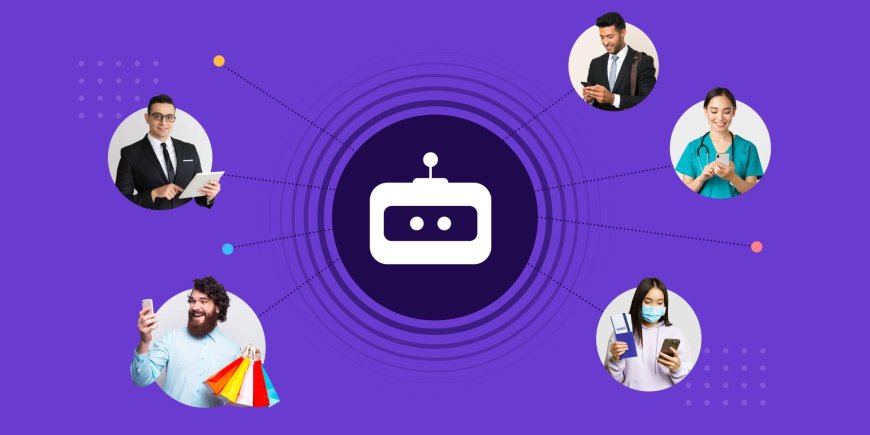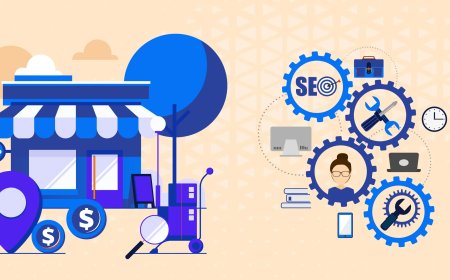10 Cutting-Edge Use Cases That Prove AI Voice Bot Development Is Transforming Business in 2025
AI voice bot development is revolutionizing how companies operate, serve customers, and drive growth in 2025.

In 2025, AI voice bot development is no longer a future ambitionit's a critical tool driving real-time, intelligent, and seamless business operations across industries. Once limited to basic phone menus or scripted commands, todays AI voice bots are powered by advancements in natural language processing (NLP), machine learning, emotion recognition, and real-time speech-to-text technologies.
From healthcare and e-commerce to logistics and banking, businesses are increasingly deploying voice bots not just to support, but to lead customer engagement, automate operations, and deliver hyper-personalized serviceall while reducing costs and enhancing efficiency.
In this blog, we explore 10 cutting-edge use cases that demonstrate how AI voice bot development is transforming business in 2025.
1.Healthcare Triage & Appointment Scheduling
In 2025, healthcare providers are using voice bots to streamline patient interactions, improve accessibility, and reduce the administrative burden on staff.
Use Case:
Patients call a clinic and speak to an AI voice bot that:
-
Schedules or reschedules appointments
-
Conducts pre-diagnosis triage based on symptoms
-
Sends follow-up reminders and prescription alerts
-
Provides information on insurance coverage
Business Impact:
-
4060% reduction in receptionist workload
-
Faster patient routing during high-demand periods
-
Improved patient satisfaction through 24/7 access
2.Retail & E-commerce Voice Shopping Assistants
Voice commerce has surged, and brands now deploy voice bots to guide users through entire shopping journeysfrom discovery to checkout.
Use Case:
A customer speaks to a voice assistant on their smart speaker or mobile app to:
-
Search for products
-
Hear personalized recommendations
-
Check order status
-
Initiate returns or exchanges
Business Impact:
-
Increased conversion rates from voice-enabled convenience
-
Enhanced engagement through conversational upselling
-
Reduction in cart abandonment and post-purchase queries
3.Financial Services Voice Banking
Voice bots are transforming how customers interact with banks by providing secure, real-time voice-based self-service.
Use Case:
Users access their accounts by voice to:
-
Check balances or transaction history
-
Make payments or transfer funds
-
Report fraud or lost cards
-
Get financial advice or investment suggestions
Business Impact:
-
Reduced customer service call volumes
-
Lower operational costs and faster query resolution
-
Enhanced trust with secure voice biometrics and personalization
4.Travel & Hospitality Concierge Services
Hotels, airlines, and travel platforms are using voice bots as always-on concierges that elevate guest experiences.
Use Case:
Guests interact with a voice bot through their hotel room speaker or phone to:
-
Request housekeeping, room service, or local tips
-
Modify reservations or get flight details
-
Access loyalty account updates
Business Impact:
-
24/7 guest support with multilingual voice interaction
-
Increased cross-sell revenue (spa bookings, upgrades)
-
Streamlined hotel operations and reduced staffing pressure
5.Logistics & Supply Chain Automation
Voice bots help logistics companies manage fleet, inventory, and real-time communications, especially in time-sensitive scenarios.
Use Case:
Drivers or warehouse personnel speak to a voice assistant to:
-
Check delivery routes or reschedule drop-offs
-
Report vehicle issues or delays
-
Log deliveries or inventory changes hands-free
Business Impact:
-
Reduced paperwork and manual data entry
-
Real-time logistics tracking and fewer dispatch errors
-
Enhanced driver safety through hands-free updates
6.Telecommunications Customer Support
Telecom companies are using AI voice bots to handle complex customer issues with natural language capabilities and contextual memory.
Use Case:
A voice bot assists customers to:
-
Troubleshoot service issues (e.g., slow internet)
-
Walk through device setup and settings
-
Recommend plans or upgrades
-
Process SIM activations or portability
Business Impact:
-
5070% call deflection from human agents
-
Higher resolution speed with intelligent self-service
-
Reduced customer churn through improved support
7.Real Estate Property Inquiries
Real estate firms are deploying voice bots to qualify leads, answer inquiries, and schedule property visitsall through conversational interfaces.
Use Case:
A prospective buyer calls a real estate firm and speaks to a voice bot that:
-
Provides details about properties
-
Captures budget and preferences
-
Books site visits or connects to agents
Business Impact:
-
24/7 lead qualification and engagement
-
Reduced lead response time
-
Increased property viewing conversions
8.Education & eLearning Voice Tutors
Education platforms are using AI voice bots to offer on-demand tutoring, test prep assistance, and course navigation.
Use Case:
Students interact with voice bots via apps or smart devices to:
-
Solve subject-related questions
-
Receive personalized learning feedback
-
Get reminders for lessons and assignments
Business Impact:
-
Higher student engagement and retention
-
Scalable tutoring support without additional staff
-
Better learning outcomes via personalized voice instruction
9.Legal & Insurance Policy Support
Legal firms and insurance providers are automating policy-related support and claims guidance through voice bots.
Use Case:
Policyholders talk to a voice bot that can:
-
Explain policy terms in plain language
-
File and track claims
-
Offer guidance on required documents
Business Impact:
-
Reduced call handling time
-
Improved user understanding of complex legal/insurance content
-
Increased claim filing efficiency and accuracy
10.Human Resources & Recruitment
Companies are automating initial HR queries and candidate screening using voice bots that interact with employees and job seekers.
Use Case:
Voice bots assist with:
-
Screening job applicants with voice-based interviews
-
Answering FAQs about benefits or leave policies
-
Onboarding new employees with interactive guidance
Business Impact:
-
Streamlined recruitment cycles
-
Enhanced employee experience with instant support
-
Reduced HR workload through automation
What Makes These Voice Bots So Effective in 2025?
These cutting-edge use cases work because AI voice bots in 2025 offer:
? Multi-turn, human-like conversations
They remember context, adapt tone, and handle dynamic back-and-forth.
? Multilingual & Emotionally Intelligent Interactions
Bots speak and understand multiple languages, detect user sentiment, and respond with empathy.
? Omnichannel Integration
Voice bots are deployed across smart speakers, IVR systems, mobile apps, and web platformsensuring consistent, connected experiences.
? Real-Time Personalization
Bots access CRM, transaction data, and preferences to deliver tailored responses and services.
? Secure, Compliant Architecture
Voice data is encrypted, with voice biometrics ensuring authentication and regulatory compliance across sectors.
Conclusion
These 10 real-world use cases highlight a clear truth: AI voice bot development is fundamentally transforming how businesses operate, engage, and grow in 2025. From improving customer satisfaction and operational efficiency to driving innovation in user experience, voice bots are becoming indispensable assets across industries.
As voice interfaces continue to evolve, the businesses that embrace them today will shape the competitive landscape tomorrow.











































